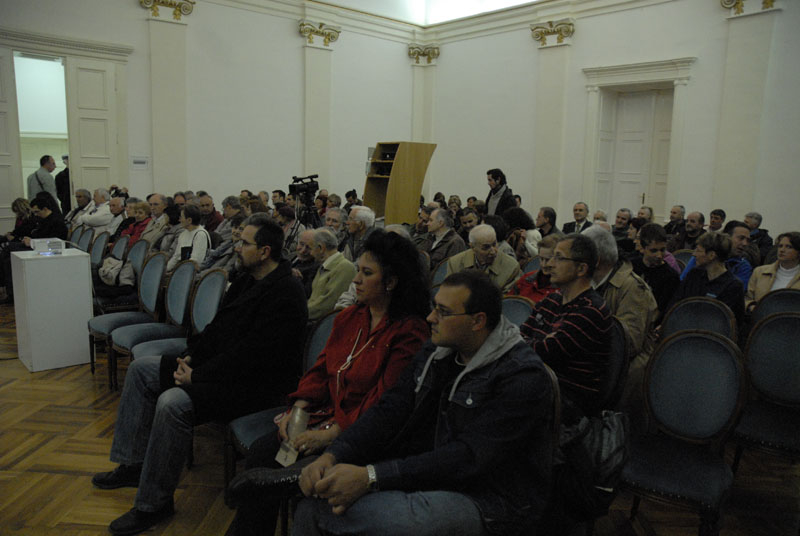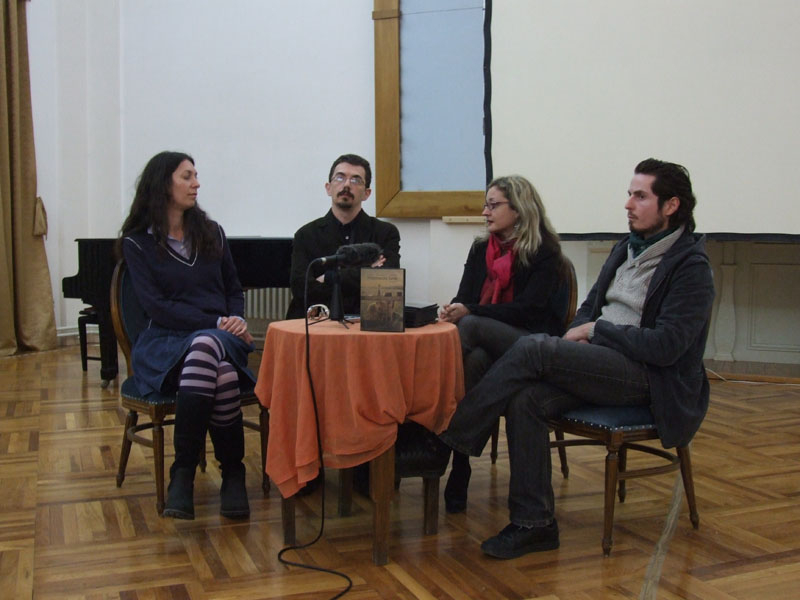“Mein Vater sagte mir, ich wäre ein Ungar” - Neunte Station der Film-Tour in Kikinda (10.4.2012)
150 Besucher fanden sich am 10. April 2012 in den bis auf den letzten Platz gefüllten Saal des Nationalmuseums in Kikinda (Banat) ein, um der neunten Station der Film-Tour von Regisseur Marko Cvejic mit seinem Doku-Drama “Die Donauschwaben” (Danube Swabians/Podunavske Svabe) beizuwohnen. Die Gemeinde Kikinda umfasst neben der Stadt noch neun umliegende Orte und weist laut Volkszählung aus dem Jahre 2002 rund 67 000 Einwohner aus. Davon bekannten sich 76 Prozent als Serben, dreizehn Prozent als Ungarn.
An der Podiumsdiskussion, die sich an die Film-Vorführung anschloss, beteiligten sich die Historikerin Marijana Toma, der Schriftsteller Srdan Tesin und Regisseur Marko Cvejic. Besonders bewegend waren die Äußerungen eines Zuhörers, der einen sehr persönlichen Zugang zum Film fand. “40 Jahre lang dachte ich, dass ich ein Ungar wäre, weil mein Vater mir das so gesagt hatte. … Mein Vater war ein Deutscher, aber nach dem Krieg hat er sich als Ungar ausgegeben – wegen seiner Familie. Die Deutschen schwiegen in ihren Familien”, zeigte sich der Teilnehmer schockiert, dass nicht einmal sein eigener Vater sich getraut hatte, über die Identität der Familie zu sprechen.
Bemerkenswert auch die Aussagen von Gordana Perunovic Fijat vom Kulturzentrum Kikinda: “Wir haben darüber in der Schule nichts gelernt, aber in meiner Familie gab es ältere Personen, die gesagt haben, dass Geschichte nicht nur das ist, was in der Schule gelernt wird und auf diese Weise erfuhr ich von den Schwaben und viele andere Dinge.”
Die Historikerin Marijana Toma erklärte: “Dass wir jetzt, im Jahr 2012, über solche Fragen sprechen, zeigt uns, dass unsere Gesellschaft Jahrzehnte lang in einem Zustand der Verweigerung, des Verschweigens gelebt hat.” Als Schriftsteller drückte Srdan Tesin sein besonderes Interesse an den persönlichen Schicksalen der Menschen aus. “Als ich 30 Jahre alt war, fand ich heraus, dass es in Rudolfsgnad (Knicanin) ein Lager gab, dass es in Kikinda auch so etwas Ähnliches wie ein Lager gab”, so Tesin.
Marko Cvejic, der junge serbische Regisseur, präsentiert das Doku-Drama “Die Donauschwaben” (Danube Swabians/Podunavske Svabe), in dessen Mittelpunkt die Verbrechen des Tito-Regimes an den Donauschwaben in den Jahren 1944 bis 1948 steht, in den Monaten März und April an ingesamt dreizehn Orten in der Vojvodina, ehe im Mai und Juni weitere Termine in Deutschland folgen.
Die DVD “Die Donauschwaben” (Danube Swabians/Podunavske Svabe) mit deutschen Untertiteln ist ab sofort über das Donauschwäbische Zentralmuseum in Ulm zu bestellen. Die Kontaktdaten lauten:
Donauschwäbisches Zentralmuseum
Schillerstraße 1
D-89077 Ulm
Tel: +49 731 – 96 254 - 0
Fax: +49 731 – 96 254 - 200
ePost: info@dzm-museum.de
Internetseite: www.dzm-museum.de
Mehr zum Film “Die Donauschwaben” (Danube Swabians/Podunavske Svabe) und zur Film-Tour unter:
Die gesammelten Meldungen zu Marko Cvejics Film “Die Donauschwaben
Weitere Informationen über die offizielle Internetseite der serbischen Filmproduktionsfirma:
www.mandragorafilm.com
 alt=”Kikinda” width=”800” height=”536”
Bis zum Beginn der Film-Vorführung war der Saal im Nationalmuseum von Kikinda bis auf den letzten Platz gefüllt - Foto: Visnja Cupic Jovanovic
alt=”Kikinda” width=”800” height=”536”
Bis zum Beginn der Film-Vorführung war der Saal im Nationalmuseum von Kikinda bis auf den letzten Platz gefüllt - Foto: Visnja Cupic Jovanovic
Kikinda, 11. April 2012. – Juče je u sali Narodnog muzeja Kikinda, ispunjenoj do poslednjeg mesta, održana projekcija filma “Podunavske Švabe”.
U prostoru koji je bio ispunjen sa oko 150 posetilaca, usledila je rasprava nakon projekcije. Tokom panel diskusije o temi filma, stradanju Podunavskih Švaba nakon Drugog svetskog rata govorili su: Marijana Toma, istoričarka, Srđan Tešin, književnik, i Marko Cvejić, reditelj i scenarista filma.
Marijana Toma, istoričarka, rekla je da “Samim tim što mi tek sada, 2012. godine, govorimo o ovim temama, ukazuje na to da naše društvo već decenijama živi u stanju poricanja. Zato su bitne ovakve vrste eksperimenata, umetnost ima najveću mogućnost da otvori ovakve teme, da se kroz umetnost osnažimo da pričamo o tome. Književnik Srđan Tešin istakao je: “Istorija se bavi kvalifikatorima i kvantifikatorima, govori o narodima, brojkama, a ovde u filmu imate konkretne osobe i lične priče. Mene kao pisca interesuju te lične priče. O tome se ne govori, ja sam za te zločine saznao tek u svojoj tridesetoj godini, da je postojao logor u Knićaninu, da je i u Kikindi bila neka vrsta logora. Ta ravnodušnost ljudi prema zlu mi je bila važnija kao tema jer je to generator svih sledećih zala koja će se dešavati.”
Zoran Ilić, novinar televizije Rubin, smatra da stvari treba nazvati pravim imenom, mi ovde imamo teror komunizma, koji je u Poljskoj i drugim zemljama osvešćen. “Tu dolazimo do pitanja da li smo mi kao društvo spremni da se suočavamo sa prošlošću koja ima ideološki prizvuk. Bez tog suočavanja mi ne možemo da gradimo multikultularno društvo. I žrtve i zločinci imaju imena i prezimena. Smeta mi što u filmu nisu spomenute tajne službe Jugoslavije koje su vršile zločine.”
Kao odgovor na prethodnu izjavu, jedan od učesnika navodi “Odgovornost za ono što se dogodilo ne bih pripisao komunističkom teroru nego teroru pojedinaca. Kada budu otvorene arhive jednog dana znaće se imena onih koji su u ime ideologije činili zločine prema Podunavskim Švabama. Ja sam odrastao i živim u kući Podunavskih Švaba, živeo sam u tom okruženju, oni nikada te događaje nisu spominjali, nisu se žalili. Moja tetka je udata za Podunavskog Švabu i jako mi je krivo što je nisam slušao kad je bila raspoložena da priča o tome. Iza svakog ubistva i onoga što se naziva zločin stoji ličnost, sa imenom i prezimenom, matičnim brojem. Stvarno sam iznenađen da ste imali hrabrosti da ovaj film prikazujete, ja i dalje smatram da mi ne živimo u demokratiji.”
Kroz diskusiju jedna od učesnica je navela: “Ja sam veoma lično doživela ovaj film, 40 godina sam mislila da sam Mađarica, tako mi je otac rekao. Ovaj film sam doživela kao dokument mog porekla. Prvo sam čula za logore, čitala sam literaturu, sad gledam ovaj film, sastavljam kockice. Moj otac je uvek ćutao o tome ko smo, kad smo pitali to je bio tabu, naizlazili smo samo na ćutanje. Nije ćutanje prisutno samo u društvu, moj tata je bio Nemac, ali se nakon rata izjasnio kao Mađar, zbog svoje porodice. Nemci su ćutali u svojim porodicama, moj otac nije smeo da mi kaže. Meni je to strašno ja sad tek saznajem, začuđena sam da ni moj otac ni društvo nisu smeli da mi kažu.”
“Nismo učili u školi o ovome, ali u mojoj porodici su postojali stariji ljudi koji su mi rekli da istorija nije samo ono što se uči u školi, i tako sam saznala za Švabe i mnoge druge stvari. Koliko god ljudi dobro sahranjivali istoriju, ona uvek iskoči sa lopate. Da citiram Teri Pračeta, istoriju pišu pobednici, ali uvek im nešto promakne,” rekla je Gordana Perunović Fijat iz Kulturnog centra Kikinda.
Tijana Rolović
PR Mandragora film

von links nach rechts die Teilnehmer der Podiumsdiskussion: Politikwissenschaftlerin Jelena Krstic (Moderation), Schriftsteller Srdan Tesin, Historikerin Marijana Toma, Regisseur Marko Cvejic - Foto: Visnja Cupic Jovanovic
At 10th April 2012 in the hall of the National Museum of Kikinda, filled to the last place, the projection of the film “Danube Swabians” was held.
The space was filled with about 150 visitors. A panel discussion followed the screening on which Marijana Toma, historian, Srđan Tešin, writer, and Marko Cvejić, director and screenwriter were talking.
Marijana Toma said: “Because we are talking about these issues now, in the year 2012., indicates that our society has lived for decades in a state of denial. That’s why this kind of experiments are important, art has the greatest opportunity to open up these kind of issues, to strengthen ourselves true the art to talk about it. Srđan Tešin said: “History deals with the qualifiers and quantifiers, talking about the people and figures, but here in this film you have a specific person’s personal stories. As a writer, I’m very interested in these personal stories. There is silence about it; I found out about these crimes when I was thirty, that there was a camp in Knićanin, that in Kikinda was some sort of camp aswell. This indifference to the evil was more important to me as a topic because it is the generator of all the evils which will happen.”
Zoran Ilić, journalist of TV Rubin, believes that we should call a spade a spade; here we have the terror of communism, which was in Poland and other countries awakened. “Here we have come to the question whether we are, as a society, ready to face a past that has ideological overtones. Without this confrontation, we cannot build multicultural society. The victim and perpetrator have names and surnames. It bothers me that in this film Yugoslav secret services who committed crimes are not mentioned.”
As a response to the previous statement, one participant said: “The responsibility for what happened I shouldn’t be marked as the communist terror, but the terror of individuals. When they open the archives one day we will know the names of those who committed the crimes on the Danube Swabians, in the name of ideology. I grew up and I still live in the house of the Danube Swabians. I lived in that environment, they never mentioned these happenings, they have never complain. My aunt was married to the Danube Swabian and I really felt bad that I did not listen when she was in the mood to talk about it. After each murder and what is called crime, is a person, with full name and identification number. I’m really surprised that you had the courage to show this film; I still think we don’t live in a democracy.”
During the discussion one of the participants stated: “I experienced this film very personally. For 40 years I thought I was Hungarian, because my father told me that. I experienced this film as a document of my origin. First I heard about the camps, I read literature, and now I watched this film; I assemble pieces. My father has always remained silent about who we are, when we asked it was a taboo, we got only the silence. Silence is not present only in society, my dad was a German, but after the war, he declares himself a Hungarian, because of his family. The Germans were silent in their families; my father did not dare to tell me. I found it terrible that I’m figuring out now, I am shocked that neither my father nor society were not allowed to tell me.”
“We haven’t learned in school about this, but in my family there were older people who have said that history is not only what is taught in school, and so I learned about the Swabians and many other things. No matter how good the people try to bury the history, it always pops up from a shovel. To quote Terry Pratchett: “The winers write history, but they always miss something.” Said Gordana Perunović Fijat from the Cultural Center of Kikinda.
Tijana Rolović
PR Mandragora film
